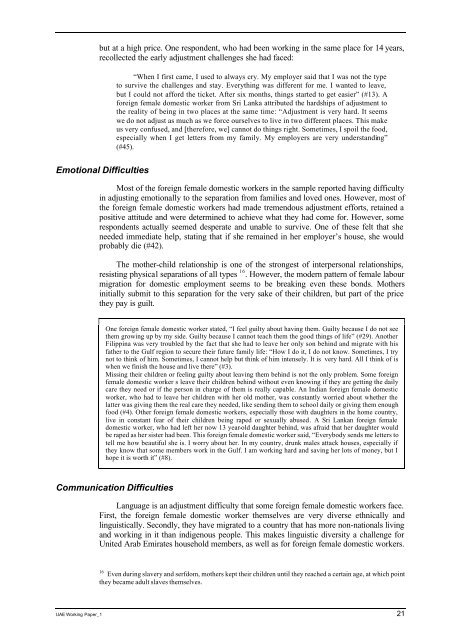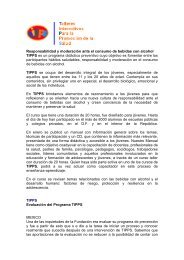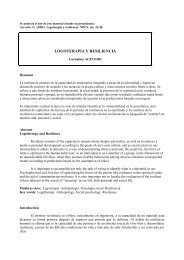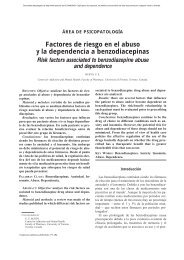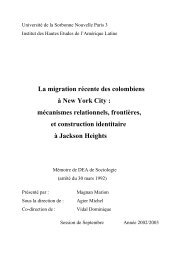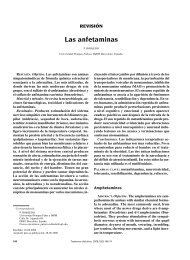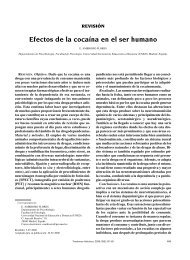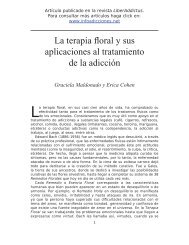migrant women in the United Arab Emirates
migrant women in the United Arab Emirates
migrant women in the United Arab Emirates
You also want an ePaper? Increase the reach of your titles
YUMPU automatically turns print PDFs into web optimized ePapers that Google loves.
ut at a high price. One respondent, who had been work<strong>in</strong>g <strong>in</strong> <strong>the</strong> same place for 14 years,<br />
recollected <strong>the</strong> early adjustment challenges she had faced:<br />
“When I first came, I used to always cry. My employer said that I was not <strong>the</strong> type<br />
to survive <strong>the</strong> challenges and stay. Everyth<strong>in</strong>g was different for me. I wanted to leave,<br />
but I could not afford <strong>the</strong> ticket. After six months, th<strong>in</strong>gs started to get easier” (#13). A<br />
foreign female domestic worker from Sri Lanka attributed <strong>the</strong> hardships of adjustment to<br />
<strong>the</strong> reality of be<strong>in</strong>g <strong>in</strong> two places at <strong>the</strong> same time: “Adjustment is very hard. It seems<br />
we do not adjust as much as we force ourselves to live <strong>in</strong> two different places. This make<br />
us very confused, and [<strong>the</strong>refore, we] cannot do th<strong>in</strong>gs right. Sometimes, I spoil <strong>the</strong> food,<br />
especially when I get letters from my family. My employers are very understand<strong>in</strong>g”<br />
(#45).<br />
Emotional Difficulties<br />
Most of <strong>the</strong> foreign female domestic workers <strong>in</strong> <strong>the</strong> sample reported hav<strong>in</strong>g difficulty<br />
<strong>in</strong> adjust<strong>in</strong>g emotionally to <strong>the</strong> separation from families and loved ones. However, most of<br />
<strong>the</strong> foreign female domestic workers had made tremendous adjustment efforts, reta<strong>in</strong>ed a<br />
positive attitude and were determ<strong>in</strong>ed to achieve what <strong>the</strong>y had come for. However, some<br />
respondents actually seemed desperate and unable to survive. One of <strong>the</strong>se felt that she<br />
needed immediate help, stat<strong>in</strong>g that if she rema<strong>in</strong>ed <strong>in</strong> her employer’s house, she would<br />
probably die (#42).<br />
The mo<strong>the</strong>r-child relationship is one of <strong>the</strong> strongest of <strong>in</strong>terpersonal relationships,<br />
resist<strong>in</strong>g physical separations of all types 16 . However, <strong>the</strong> modern pattern of female labour<br />
migration for domestic employment seems to be break<strong>in</strong>g even <strong>the</strong>se bonds. Mo<strong>the</strong>rs<br />
<strong>in</strong>itially submit to this separation for <strong>the</strong> very sake of <strong>the</strong>ir children, but part of <strong>the</strong> price<br />
<strong>the</strong>y pay is guilt.<br />
One foreign female domestic worker stated, “I feel guilty about hav<strong>in</strong>g <strong>the</strong>m. Guilty because I do not see<br />
<strong>the</strong>m grow<strong>in</strong>g up by my side. Guilty because I cannot teach <strong>the</strong>m <strong>the</strong> good th<strong>in</strong>gs of life” (#29). Ano<strong>the</strong>r<br />
Filipp<strong>in</strong>a was very troubled by <strong>the</strong> fact that she had to leave her only son beh<strong>in</strong>d and migrate with his<br />
fa<strong>the</strong>r to <strong>the</strong> Gulf region to secure <strong>the</strong>ir future family life: “How I do it, I do not know. Sometimes, I try<br />
not to th<strong>in</strong>k of him. Sometimes, I cannot help but th<strong>in</strong>k of him <strong>in</strong>tensely. It is very hard. All I th<strong>in</strong>k of is<br />
when we f<strong>in</strong>ish <strong>the</strong> house and live <strong>the</strong>re” (#3).<br />
Miss<strong>in</strong>g <strong>the</strong>ir children or feel<strong>in</strong>g guilty about leav<strong>in</strong>g <strong>the</strong>m beh<strong>in</strong>d is not <strong>the</strong> only problem. Some foreign<br />
female domestic worker s leave <strong>the</strong>ir children beh<strong>in</strong>d without even know<strong>in</strong>g if <strong>the</strong>y are gett<strong>in</strong>g <strong>the</strong> daily<br />
care <strong>the</strong>y need or if <strong>the</strong> person <strong>in</strong> charge of <strong>the</strong>m is really capable. An Indian foreign female domestic<br />
worker, who had to leave her children with her old mo<strong>the</strong>r, was constantly worried about whe<strong>the</strong>r <strong>the</strong><br />
latter was giv<strong>in</strong>g <strong>the</strong>m <strong>the</strong> real care <strong>the</strong>y needed, like send<strong>in</strong>g <strong>the</strong>m to school daily or giv<strong>in</strong>g <strong>the</strong>m enough<br />
food (#4). O<strong>the</strong>r foreign female domestic workers, especially those with daughters <strong>in</strong> <strong>the</strong> home country,<br />
live <strong>in</strong> constant fear of <strong>the</strong>ir children be<strong>in</strong>g raped or sexually abused. A Sri Lankan foreign female<br />
domestic worker, who had left her now 13 year-old daughter beh<strong>in</strong>d, was afraid that her daughter would<br />
be raped as her sister had been. This foreign female domestic worker said, “Everybody sends me letters to<br />
tell me how beautiful she is. I worry about her. In my country, drunk males attack houses, especially if<br />
<strong>the</strong>y know that some members work <strong>in</strong> <strong>the</strong> Gulf. I am work<strong>in</strong>g hard and sav<strong>in</strong>g her lots of money, but I<br />
hope it is worth it” (#8).<br />
Communication Difficulties<br />
Language is an adjustment difficulty that some foreign female domestic workers face.<br />
First, <strong>the</strong> foreign female domestic worker <strong>the</strong>mselves are very diverse ethnically and<br />
l<strong>in</strong>guistically. Secondly, <strong>the</strong>y have migrated to a country that has more non-nationals liv<strong>in</strong>g<br />
and work<strong>in</strong>g <strong>in</strong> it than <strong>in</strong>digenous people. This makes l<strong>in</strong>guistic diversity a challenge for<br />
<strong>United</strong> <strong>Arab</strong> <strong>Emirates</strong> household members, as well as for foreign female domestic workers.<br />
16 Even dur<strong>in</strong>g slavery and serfdom, mo<strong>the</strong>rs kept <strong>the</strong>ir children until <strong>the</strong>y reached a certa<strong>in</strong> age, at which po<strong>in</strong>t<br />
<strong>the</strong>y became adult slaves <strong>the</strong>mselves.<br />
UAE Work<strong>in</strong>g Paper_1 21


